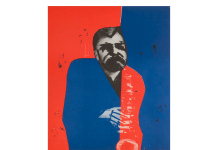Christopher Nolan’s “The Dark Knight Rises” has ranked number one in the box office every weekend since being released.
Maybe this is due to how many similarities between presidential candidates and the movies main characters. Maybe it’s because this movie closely mimics the Occupy movement. Perhaps it’s because it’s the third and final film in the Batman trilogy.
Regardless, the film has gotten more than it’s fair share of publicity. Opening weekend began with the tragic shooting in Auroa, but the movie was getting plenty of publicity before that.
The likeliness between presidential candidate Mitt Romney and, movie villain, Bane and, hero, Batman has been dually noted.
Though perhaps the most obvious and surface level theme in this movie is related to the Occupy movement and ongoing battle between the 99 percent and 1 percent. The 99 percent being represented by Bane and his army of anarchists while the 1 percent is represented by capitalist Bruce Wayne.
The entire movie ends up reading as pro-capitalism regardless of what people think it says about political candidates. In the end, Bane loses and Batman triumphs—the rich capitalist win.
However, I don’t think it’s that simple. This is a very surface-level interpretation of the film and the most ignorant of viewers should understand Batman is hardly a surface-level kind of hero.
A movie doesn’t remain a popular success by just having cool special effects and great action shots. A movie as successful as “The Dark Knight Rises” remains successful by having a strong message that appeals to the masses.
In current economic times, the idea of stability is more than appealing to the masses and Batman, as complex as he is, proves to be the hero we all want once again. He too is broken, both mentally and financially—though admittedly, not as badly as most of Gotham—and he rises to save himself and the entire city.
He fights against Bane’s socialist chaos and stands as a firm pillar for capitalism. Batman is the rich Wall Street guy turned good and he’s asking us to trust in the rich again because they will restore order to the chaos we are currently amidst.
Though capitalists and anarchists aside, the movie does a handsome portrayal of the police department. Promoted police detective Robin ends up being one of the most likeable and humane characters in the film and the same goes for Commissioner Gordon throughout the entire trilogy.
Police have been the heart of a lot of controversy as of late, with the Anaheim riots and violence against Occupy protesters, but this movie shows them as the heroes they are supposed to be—strong, brave, and honest.
Again, this is depicting a pro-capitalist image until Robin resigns because of all the hypocrisy he’s witnessed from the inside. It seems he might become the new Batman, but in doing so he is stepping away from the traditional government structure and trying to do good on his own terms.
In the end, all the movies heroes seem to walk away from the capitalism they fought to preserve because in their heart they see the flaws. I’m not sure this is a pro-capitalist message, but it is one to which, I think, the masses can relate.
We all want to have faith in our government and we want it to be stable and honest, but, like our heroes, it seems, we are quickly becoming disillusioned. Maybe Bane doesn’t have it right with total anarchy, but I think it’s safe to say Wall Street and our government don’t have running society perfected either.













